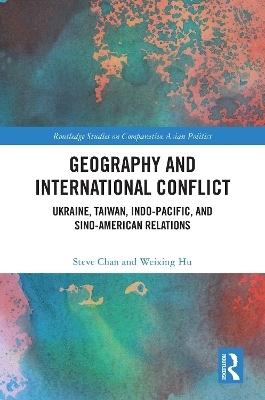
Geography and International Conflict
Routledge (Verlag)
978-1-032-91571-5 (ISBN)
- Lieferbar (Termin unbekannt)
- Versandkostenfrei innerhalb Deutschlands
- Auch auf Rechnung
- Verfügbarkeit in der Filiale vor Ort prüfen
- Artikel merken
This book analyzes the influence of geography— defined broadly to refer to physical size, location, terrain, accessibility, insularity, climate, regions, neighborhoods, natural endowment, strategic pathways, maritime and continental orientations and even imagined communities— on international relations.
Drawing on evidence and insights from cross- national research the book highlights geography’s enduring importance in and relevance to the ongoing Russo-Ukrainian War, tension across the Taiwan Strait, construction of regional order such as Greater Eurasia and Indo-Pacific and important differences in the nature of the security environment facing China and the U.S., respectively. It successfully bridges the gap that often separates international relations scholarship, interested in the central tendencies characterizing how states interact in general, and more idiographic approaches of Sinology providing rich country-specific details but at the expense of often overlooking features that China shares with other countries.
Offering an overview of propositions about how geography has shaped human development and institutions, alongside in- depth discussions of its role in influencing national security and interstate conflict, this book will appeal to students and scholars of international relations, political geography and comparative politics.
Steve Chan is College Professor of Distinction (Emeritus) at the University of Colorado, Boulder, USA. His publications include twenty- five books and about two hundred articles and book chapters. Weixing Hu is UM Development Foundation Distinguished Professor and Dean of Faculty of Social Sciences, the University of Macau. His research interest focuses on Asia- Pacific international relations, Chinese foreign policy and Sino- US relations.
1. Introduction: Geopolitics’ Revival and Our Plan for the Book 2. The Long Arc of Geographic Influence 3. Geography’s Influence on International Relations 4. Mackinder, Spykman, and Mahan: Is Geopolitics Still Relevant Today? 5. Ukraine: Key to the Eurasian Heartland 6. Taiwan: Lock on China’s Front Door 7. Why the Indo-Pacific? Regionalism and Imagined Communities 8. Comparing China and the U.S. Security Environment 9. Conclusion: Managing International Relations in a Hybrid World of New and Old
| Erscheinungsdatum | 22.11.2024 |
|---|---|
| Reihe/Serie | Routledge Studies on Comparative Asian Politics |
| Verlagsort | London |
| Sprache | englisch |
| Maße | 156 x 234 mm |
| Themenwelt | Naturwissenschaften ► Geowissenschaften ► Geografie / Kartografie |
| Sozialwissenschaften ► Politik / Verwaltung ► Europäische / Internationale Politik | |
| Sozialwissenschaften ► Soziologie ► Spezielle Soziologien | |
| ISBN-10 | 1-032-91571-4 / 1032915714 |
| ISBN-13 | 978-1-032-91571-5 / 9781032915715 |
| Zustand | Neuware |
| Haben Sie eine Frage zum Produkt? |
aus dem Bereich


